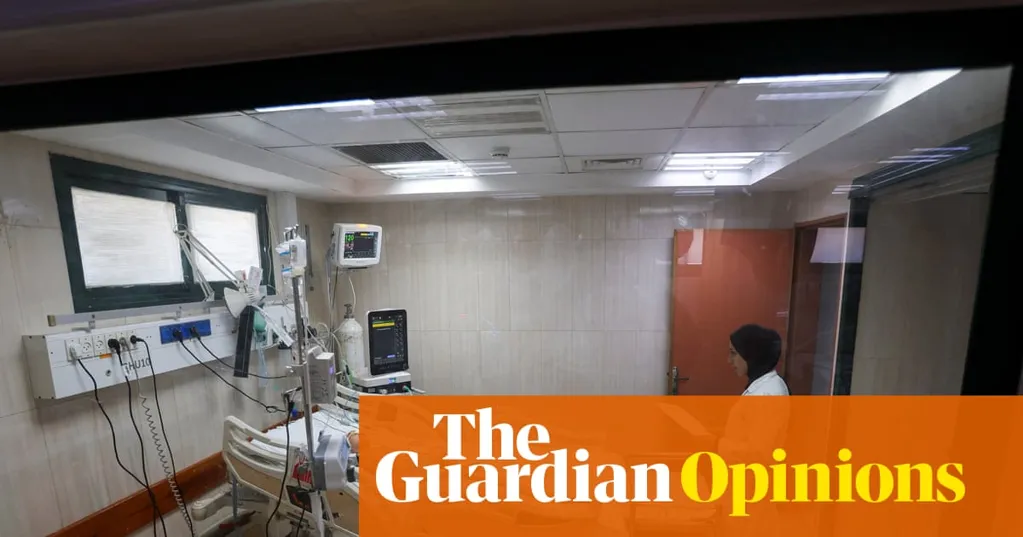If our leaders allow this massacre to pass without consequence or condemnation, it will reveal a disturbing truth about what the world is willing to accept.
Heroism is no longer an abstract concept to me - it looks like Ali, who once spotted a quadcopter circling Al-Aqsa hospital in central Gaza, where he'd dropped me off less than an hour earlier. When the first airstrike slammed into the building, Ali ran: not away from danger but towards it, risking his own safety for mine. That morning, as subsequent strikes rattled the walls around us and as I phoned my sister ("Tell Mum and Dad I love them heaps - just in case"), Ali remained by my side.
Seldom in history have healthcare workers been called upon to risk their lives simply by reporting for duty.
I am not referring to people such as myself - the internationally mobile staff who fly freely in and out of crisis zones, quietly reassured that safety awaits us at the end of our assignments. We return home to security, to family and, sometimes, to applause. Occasionally we are even lauded as heroes. But "hero" is a label I reject. It does not belong to me.
It belongs to those who don't have the option to leave: the Palestinian healthcare and humanitarian workers who have reported for duty every single day for 650 days under siege. Working alongside them has been the greatest honour of my life.
And the children we care for - they too carry their own brand of heroism.
I think of Nayla*, a 10-year-old girl who came to our field hospital after an airstrike. Her limbs were shattered - and the pressure generated from the shock wave was so immense that her stomach and small intestine had perforated. Her mother, along with her brother, had died in the same strike that left her small body riddled with holes. By then the blockade had ensured our supplies were reduced to critically low levels. Rationing the fuel to run our operating theatres, short on surgical supplies for her fractures and gastrointestinal repairs, and without the specialised nutrition needed to keep her alive, Nayla fought. She was so malnourished that her wounds refused to heal. Infection invaded her bones. The night Nayla awoke from her coma I lay awake in my tent, listening to her screams - she cried for a mother who would never come.
Then there were the young siblings, lying side by side. Their bodies had been torn apart by shrapnel and the fragments embedded so deeply that the surgeons had to dig them out, one by one.
Just a few feet away lay the bruised and mottled body of a four-month-old orphan. His leg was encased in plaster, after having been broken before he could even learn to crawl. There would be no one to carry him - he had already lost both parents in a separate airstrike two months earlier.
These stories were not exceptional. I heard them over and over - different voices and faces, but each story marred by the same injustice.
What I witnessed in Gaza was not war - it was a massacre.
In among this grief were the myriad staff who had been stripped of their homes and families - yet still travelled from the funerals of their own children and the rubble of their homes to care for the injured and dying. One doctor risked his safety walking four hours each way to complete his 24-hour shift, after airstrikes had rendered roads impassable.
A small number even had a brief opportunity to flee in the early weeks of the war. They refused. They chose instead to farewell their families - perhaps for the last time - then quietly returned to their posts.
A cursory glance at the reported data shows how real the risk is. Conservative estimates show that airstrikes, shelling and gunshots have killed more than 1,580 healthcare workers and almost 18,000 children. These are not just statistics. They are people I knew. They are the people who stayed.
If our leaders allow this to pass without consequence or condemnation, it reveals a disturbing truth about what we are willing to accept: that the execution of healthcare workers and the slaughter of children has become our new norm.
The steps needed to save these children - and the workers risking their lives to care for them - are not just nebulous ideals.
Australia must demand an unequivocal end to the blockade and weaponisation of aid. The fortnight prior to my departure from Gaza, the specialised nutrition that Nayla had needed initially wasn't available in a single medical facility across the strip. I learned today that she will go on to have her leg amputated.
We must demand an end to the bombing of hospitals and bulldozing of ambulances. Al-Aqsa hospital has been targeted with airstrikes yet again since I was last there. Not a single ministry of health hospital remains fully functional.
We must demand a permanent ceasefire so that doctors and nurses can care for victims of war, without laying down their own lives.
When I think about heroism in the context of sacrifice, I think about Rifaat Radwan, one of 15 Palestinian emergency workers found buried in a mass grave. He was shot while trying to rescue others. Just before he died, he recorded his final words: "Forgive me, Mama ... This is the path I chose to help people."
His words echo those of my colleagues when I once pressed: "How do you keep going? Aren't you exhausted?" She looked me in the eye calmly: "Of course we're tired. But this is our life now and this is probably how I die. If we die we'll do it saving as many lives as we can."
They are the real heroes. They are the ones who stay. And they deserve more than our silence.
